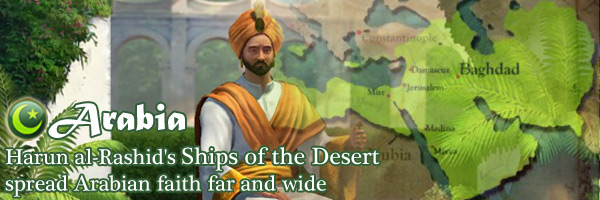
Continuing my series of strategy posts about Brave New World's modified civilizations, I'm going to take a look at strategies for Arabia. Arabia received a modest revision in Brave New World out of the box, having its national trait moderately redesigned. The old city connection economic focus has been regeared towards Brave New World's new trade route mechanic, and a religious buff was also added to make this civ more compelling for Gods & Kings mechanics.
The majority of the Arabian peninsula is harsh desert, and so massive human settlement did not begin until the rise of the Islamic empires of the middle ages. In the early seventh century, the Prophet Muhammad began preaching the tenets of Islam in Mecca and Medina, which united several Arabian tribes and led to the establishment of the Caliphate, an Islamic empire that began to extend its influence across the peninsula and beyond. In the mid seventh century, the Caliphate began conquering territory from the Byzantine empire and they completely destroyed the once-powerful Persian empire that had dominated the region since antiquity. At its height, the Caliphate extended from Portugal, Spain, and Morocco in the west, all the way to the borders of India in the east. Arabia's position as a crossroads between west and east made it a center for powerful trading hubs, and Arabian engineers and scientists developed advanced new mathematical concepts. Goods, knowledge, and religious beliefs from both ends of the known world (and beyond) often passed through Arabian trading bazaars, and much of the knowledge of the classical Greeks and Romans were preserved by Islamic scholars, eventually contributing to the European Renaissance centuries later.

Harun al-Rashid ruled during the mid eighth century during the Caliphate's golden age. He has been strongly romanticized by Arabian authors and scholars, and has even been mythologized in tales included in the Book of One Thousand and One Nights. He was known as a sharp political, intellectual, and military mind, but it is difficult to separate factual accounts from fictitious ones. Even his exact birth date is debatable. He was Caliph during one of the greatest periods of expansion of the early caliphates, but he also almost destroyed the Caliphate by dividing the empire among his sons instead of naming a single heir. This led to prolonged civil war between the sons, but the Caliphate did survive the turmoil.
[More]
91119a55-7a39-4ebe-9d91-07545ab26c34|3|5.0
Tags:Sid Meier's Civilization, Civilization V: Brave New World, Civilization V, ranged mounted unit, bazaar, Arabia, Harun al-Rashid, Ships of the Desert, Camel Archer, luxury resource, trade, trade route, caravan, cargo ship, religion, religious pressure, Religious Texts, Grand Temple, Market, Knight, Indonesia, oil, oasis, Civ-V
UPDATE (September 9, 2014, 2:45 PM Pacific Time)
Shortly after publishing this blog, I came across a forum post that contradicts the information presented in this blog post. As such, I will review the actual source code in the Civilization V dll, do some more testing with the game, and revise the post as necessary. In the meantime, I'll leave the unaltered post here, for posterity. I apologize for the inconvenience.
A lot of buildings in Civilization V mention that they are affected by tiles or resources "near the city", but this quality of being "near a city" is poorly-defined within the game. So what exactly does it mean? I haven't seen any in-depth articles about this topic on the web or in the game's Civilopedia, so I thought I'd outline the important bits here.
Basically, a tile is "near" a city if that city was the first city in its respective empire to claim that tile within its workable radius.
So if you have a single tile or resource that lies between two cities, and both cities' workable ranges overlap that same tile, then that tile is not "near" both cities. It is only "near" the first city that owned that tile. This means that if you go into the city management screen and assign the second city to work that tile, it may receive yield bonuses associated with any improvements or buildings that affect it (such as the stable buffing pasture resources), but the tile's contents will not be considered "near" that second city for other purposes. This includes:
- requirement of an improved Horse or Ivory to build a Circus,
- requirement of an improved Horse, Cow, or Sheep to build a Stable,
- requirement of an improved Iron to build a Forge,
- requirement of an improved Stone or Marble to build a Stone Works,
- requirement of an improved Gold or Silver to build a Mint,
- wonder production bonus from nearby Marble,
- requirement that the city be adjacent to a Mountain in order to build an Observatory,
- trade route income from resource diversity,
- and so on...
Say you have two cities (for example Rome and Antium) whose workable ranges overlap a pastured Horse. Rome was the first city to claim the Horse tile. Rome can, therefore, build a Circus (assuming Trapping has been researched). If you go to the management screen of Antium, you can assign it to work the Horse tile (which prevents Rome from being able to work that tile), but Antium still cannot build a Circus. That is, two cities cannot build a building that requires they both have the same tile.
[LEFT] Rome has annexed a tile containing horses and is building a Circus.
[RIGHT] Later, that tile overlaps with Antium's workable radius, but it cannot build a Circus because the horse was originally claimed by Rome.
Alternatively, if a resource is claimed by a city's culture, but is outside of a city's workable radius (four tiles or more away), then it never counts as "near" that city... [More]
c178571d-236f-4930-b087-5ba4b365ee97|0|.0
Tags:Sid Meier's Civilization, Civilization V, Civilization, Civilization V: Gods & Kings, Civilization V: Brave New World, Civilization: Beyond Earth, building, near, resource, luxury, resource diversity, Arabia, bazaar, Poland, Portugal, mare clausum, trade route, circus, stable, forge, stone works, mint, city borders, owned tiles, Ducal Stable, Civilization V
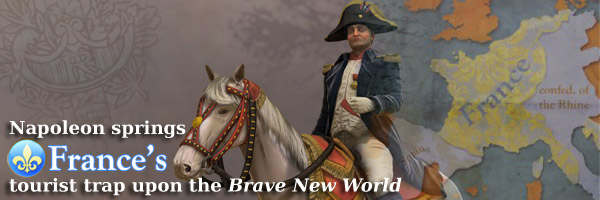
Now that I've finished my series of strategy posts about Brave New World's new civilizations, I want to take some time to look into some of the legacy civs that have received updates since Brave New World. France received a major revision in Brave New World out of the box, having its national trait completely redesigned, and one of its unique units was replaced with a powerful new unique improvement.
Humans have been occupying the land of France for at least 1.8 million years. The caves of Lascaux are a famous paleontological / archaeological site, as its cave paintings are some of the earliest and best-preserved examples of early human art and culture. After the fall of the Roman Empire, the region was split up between numerous Germanic tribes. One Germanic group, the Franks, eventually came to control most of the region, and this is where the term "France" was eventually derived. They set up the first French Kingdoms, which gained strength during the medieval periods despite threats from the Vikings and English. The European Enlightenment can trace many of its roots to the intellectual circles of France, which eventually culminated in the French Revolution that deposed and executed King Louis XVI and established a fledgling Republic.
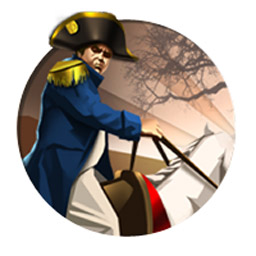
Napoleon Bonaparte seized control of this young Republic in 1799, eventually declaring himself the Emperor of France. He was a military genius of the time and an expert in the use of artillery. He conquered much of Europe from Spain all the way to Russia, and even fought campaigns in Africa (although these campaigns were not successful). His conquests helped to spread French culture, ideals, and reforms around the world, including widespread adoption of the metric system, new military traditions, and the Declaration of the Rights of Man. His armies eventually fell victim to the harsh Russian winters, which halted Napoleon's aggressions and forced a withdrawl. His reign eventually culminated in a devastating defeat at Waterloo (then part of the United Kingdom of the Netherlands). He was forced into exile on the island of Saint Helena, where he eventually died of stomach cancer in 1821.
One of Napoleon's nephews, Louis-Napoleon Bonaparte (Napoleon III), launched an enormous public works program in Paris in the mid 1800's in order to build hundreds of kilometers of wide boulevards and streets, replace the sewer system, construct parks, and be the first city in the world to install artificial lighting (originally oil-lit lanterns). This made Paris into the world's first "City of Light", allowing people to work and engage in recreational activities around the city during the night, eventually establishing a 24-hour culture and the urban nightlife.
[More]
9f3d3eec-89be-41a6-a1c0-4bd688440079|8|3.0
Tags:Sid Meier's Civilization, Civilization V: Brave New World, Civilization V, great work, theming bonus, luxury resource, Ancient Regime, France, unique improvement, Napoleon, City of Light, Chateau, Musketeer, Foreign Legion, Paris, tourism, culture, wonders, capital, Musketman, Civ-V
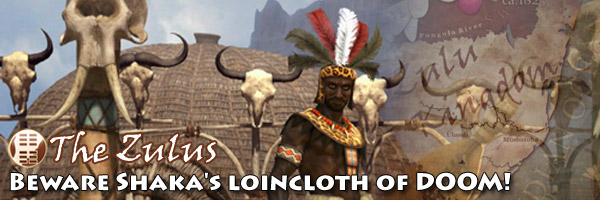
Rounding out my series of strategy posts about Brave New World's new civilizations, here is the Zulu. But first, I want to take a moment to thank the readers and everyone who has provided feedback and constructive criticism for these posts. When I first started with Assyria, I wasn't sure if I'd bother doing any other civs at all - let alone all of them! But people read the posts and encouraged me to keep writing them, and now they are among the most popular posts on this blog! I have been very humbled and gratified with the responses that I have received. I'd like to specifically thank all of those who posted suggestions and feedback on the forums. I really appreciate your participation. Many of your ideas and strategy alternatives have been incorporated into revisions of these posts, and I've taken your criticisms to heart in writing the subsequent posts. I'd also like to thank the fine folks at PolyCast, who have taken the time to discuss and publicize these posts, as well as provide additional feedback. Keep up the good work!
As for my future plans: I expect to take some time away from Civ to catch up on some other games, like Dark Souls II and some Steam games that I've had sitting on my computer for a while (like Europa Universalis IV). I also intend to get back into modding and some other personal projects. This does not mean that I am completely done with Civ V strategies though. I do intend to look at some of the civs whose strategies were significantly changed by the Brave New World expansion (particularly France and Arabia, whose uniques were redesigned). I will continue to write strategies as time permits, and will continue to check the forums and comments and possibly update these posts if readers provide new insights. Thanks again, and keep on Civin'!.
Now, without further ado, the Zulu!
Little is known about the regions of southern Africa prior to European invasions and colonization. The region was divided up into small tribes and kingdoms, but they kept very few written records of their histories. In the early 19th century, the Zulu Kingdom (lead by Chief Shaka) came to dominate large chunks of the eastern coast of southern Africa. Shaka's successors expanded the kingdom through wars with rival tribes and European settlers for almost a century before the British offered an ultimatum in 1878 to King Cetshwayo regarding a territory dispute between the Zulu and the Boers (Dutch settlers in Africa). Cetshwayo rejected the terms of the ultimatum, leading to the Anglo-Zulu war. The Zulu won an early victory, overwhelming the British with their tactics and sheer numbers, handing the British their single worst defeat to a native African fighting force. In the long-term, however, the Zulu were incapable of standing up to the British army that was equipped with firearms. The British sieged the Zulu capital, Ulundi, exiled King Cetshwayo to Cape Town, and divided the Zulu Empire into 13 "kinglets". This lead to internal conflict between the kinglets, forcing the British to reinstate Cetshwayo as the King of the Zulu. But conflict continued, and Ulundi was again sieged by one of the kinglets and Cetshwayo was killed. When the Union of South Africa was formed, the Zulu Kingdom stopped being recognized as a sovereign power, although several Zulu kings did retain significant influence in the region through the middle of the 20th century.
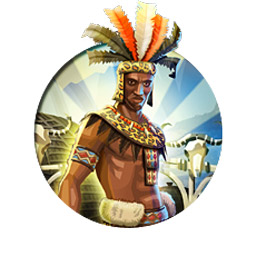
Shaka kaSenzangakhona was the first King of the Zulu Empire. He united several small tribes and then initiated significant military, spiritual, and cultural reforms. He used innovative and highly-aggressive military tactics to conquer neighboring tribes and establish the Zulu Kingdom as a dominant force in the southern Africa region. He was a brutal and efficient leader and introduced the iklwa stabbing spear and large cowhide shields that allowed his soldiers to quickly surround their enemies and engage in visceral close-quarters combat. His impi soldiers employed a novel "bull horn" formation consisting of three parts:
- the "chest" was the main force composed of senior soldiers who would engage the enemy to keep them pinned and immobile,
- the "horns" were squads of young, fast warriors who would flank the enemy that was engaged with the chest,
- and the "loins" were a reserve force behind the chest and with their backs to the battle who would defend the army from flanking maneuvers and chase down escaping enemies.
These tactics proved incredibly useful to Shaka and to his successors (even against the muskets of European invaders), and it was even used to crush the British in the opening battle of the Anglo-Zulu war. However, these tactics could not survive against the killing efficiency of more advanced firearms and cannons and were eventually abandoned. [More]
6c911954-01d0-47d1-9bc6-d03b1185221c|9|5.0
Tags:Sid Meier's Civilization, Civilization V: Brave New World, Civilization V, Zulu, Shaka, Iklwa, Ikanda, Impi, spear throw, unit maintenance, war, warmonger, promotion, buffalo, buffalo horns, buffalo chest, buffalo loins, melee, flanking, Africa, barracks, pikeman, Civ-V

Over the weekend of May 24 (Memorial Day weekend), I participated in a special edition of the bi-weekly Civilization podcast called "PolyCast". It was the two hundredth episode, and in celebration, the hosts (DanQ, MadDjinn, Makahlua, and TheMeInTeam) invited as many of the guests hosts from the previous seasons as they could track down. First, however, listeners were treated to a special Q&A session with some of the Firaxis staff, in which Civ V was discusses, as well as the recently-announced Civilization: Beyond Earth!
The episode can be streamed in its entirety at thePolyCast.net.
Among the notable points of Civ V discussion was the Firaxians' response to the question of whether Civ V would receive any more patches. Although a straight "no" was not given (leaving the door open to the possibility of one more patch this summer), they made it seem like [to me] that support for Civ V has effectively ended. This was no surprise to me, but it was still a bit of a disappointment, considering that there are still a few annoying bugs (lingering auto-annex issues, broken promotions, and multiplayer bugs) as well as some in-game descriptions that are outright misleading (such as Shoshone's Great Expanse trait description). There is also still a great deal of concern on the forums about the balance of the initial policy trees (Tradition feeling much stronger than Liberty, Honor, or Piety). So it's a shame that these issues are not likely to be addressed.

The bulk of the conversation, however, was focused around the upcoming Civilization: Beyond Earth. I'm excited about this game, but also a bit skeptical, considering the poor quality of Civ V's initial release. However, I'm hopeful that Firaxis has learned their lessons, and will release a much more stable and compelling game this time around, so that we won't have to wait for six-to-twelve months of post-release support to get a decently-playable game.
The remainder of the show was brief discussions with many of the guest hosts who have participated in the show during the years. My segment was the first such chunk. I used the opportunity to thank the PolyCast hosts for discussing and publicizing my strategy posts, and talked a little about my future plans for Civ V and Beyond Earth strategies before they had to stop me to allow others to speak. I hope I didn't come off as too self-promoting or inconsiderate...
Anyway, I look forward to PolyCast continuing to provide great material, and the release of Beyond Earth should give them plenty to talk about in future podcasts. I hope I will be invited back soon, as I enjoy the discussions with my fellow Civ-heads. [More]
1ffee739-a63c-43d2-8c52-3bf29846837d|0|.0
Tags:Civilization, Sid Meier's Civilization, Civilization V, Civilization: Beyond Earth, PolyCast, Sid Meier, Firaxis, podcast, DanQ, Makahlua, TheMeInTeam, MadDjinn, Civilization III, Civilization IV, Civilization V, Civilization: Beyond Earth
|

| 12 | | | | | | | 60 | | 11 | | | | | | | 55 | | 10 | | | | | | | 50 | | 09 | | | | | | | 45 | | 08 | | | | | | | 40 | | 07 | | | | | | | 35 | | 06 | | | | | | | 30 | | 05 | | | | | | | 25 | | 04 | | | | | | | 20 | | 03 | | | | | | | 15 | | 02 | | | | | | | 10 | | 01 | | | | | | | 05 |
|